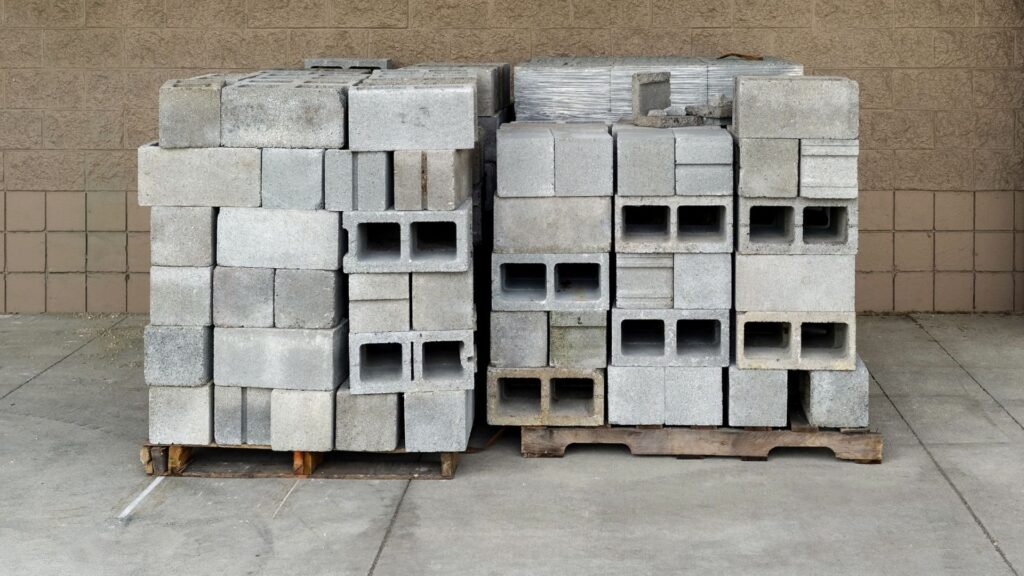Welcome to your complete guide on concrete blocks in NZ, where we’ll break down everything you need to know before starting your next project. Whether you’re building a new home, putting up a garden wall, or planning a retaining wall for your backyard, concrete blocks are one of the most practical and reliable materials you’ll come across. They’re durable, affordable, and easy to find across New Zealand, making them a top choice for both DIY enthusiasts and professional builders. In this post, we’ll cover the different types of concrete blocks, their uses, pros and cons, pricing, and where you can buy them, along with tips to help you choose the right option for your needs. By the end, you’ll have the clarity and confidence to decide if concrete blocks are the best fit for your project.
Concrete blocks in NZ are durable, cost-effective building materials used for homes, retaining walls, fences, and landscaping projects. Available in standard, solid, decorative, and retaining wall varieties, they’re designed to withstand New Zealand’s climate while offering strength and versatility. You can buy concrete blocks from local suppliers, hardware stores, and masonry specialists across NZ, with prices depending on size, type, and quantity.
- What Are Concrete Blocks?
- Why Concrete Blocks Are Popular In NZ
- Types Of Concrete Blocks In NZ
- Common Uses For Concrete Blocks
- Pros And Cons Of Concrete Blocks
- Cost Of Concrete Blocks In NZ
- Where To Buy Concrete Blocks In NZ
- Tips For Choosing The Right Concrete Blocks
- DIY Vs Hiring A Professional
- Sustainability And Eco-Friendly Options
- FAQs: About Concrete Blocks In NZ
- Conclusion
What Are Concrete Blocks?
Concrete blocks are rectangular building units made from a mix of cement, sand, aggregates, and water that hardens into a strong and durable material. They are designed to provide both structure and stability, making them a popular choice in construction projects across New Zealand. Unlike more fragile materials, concrete blocks are built to last for decades with minimal maintenance.
- Concrete blocks are different from bricks and pavers in both size and purpose: bricks are smaller, often made of clay, and usually used for decorative or load-bearing walls, while pavers are thin and designed for pathways, driveways, and outdoor flooring. Concrete blocks, on the other hand, are larger, stronger, and better suited for structural work such as house foundations, retaining walls, fences, and even landscaping projects. Their versatility is one of the reasons they are widely used in residential, commercial, and outdoor settings.
- In New Zealand, concrete blocks are often referred to by several common names: breeze blocks, masonry blocks, or simply “blocks.” Breeze blocks typically refer to decorative designs that allow airflow and light while still acting as a wall. Masonry blocks usually describe the heavier, more standard units used in structural projects. These variations in terminology reflect the wide range of block styles available to meet different building needs.
- The process of making concrete blocks is straightforward but highly effective: cement, aggregates, and sand are mixed with water, poured into molds, and then cured under controlled conditions to gain strength. This process results in a consistent, reliable product that can withstand New Zealand’s challenging weather conditions, from heavy rainfall to strong winds.
Concrete blocks remain a trusted choice for builders and homeowners alike because of their strength, adaptability, and ease of use. Whether you’re looking to build a garden wall, a fence, or a solid foundation, they provide a dependable solution that stands the test of time.
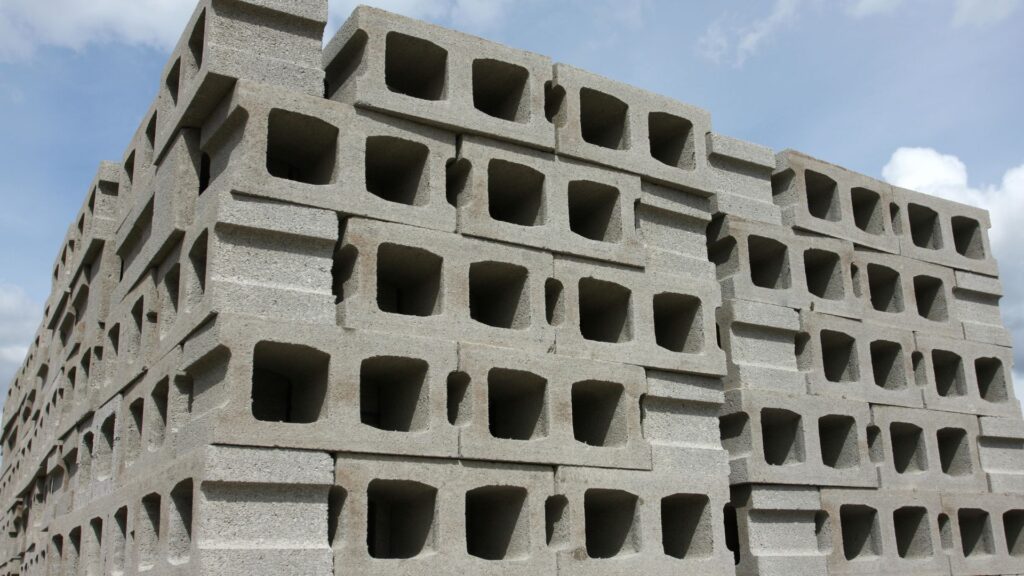
Why Concrete Blocks Are Popular In NZ
Concrete blocks have become a trusted choice in New Zealand for both residential and commercial projects because they bring together strength, availability, and long-term value. Their popularity isn’t just about tradition; it comes from their ability to deliver reliable results in a variety of building situations.
- Durability and weather resistance: New Zealand’s climate can be harsh, with wet winters, strong winds, and salty coastal air. Concrete blocks stand up well to these conditions, providing a long-lasting solution that doesn’t warp, rot, or attract pests. This makes them especially suitable for exterior walls, garden structures, and retaining walls where exposure to the elements is unavoidable.
- Availability and affordability: Concrete blocks are widely available across NZ through both large hardware stores and local suppliers. Because they are produced locally in many areas, they remain cost-effective compared to other building materials that require importing. This affordability makes them appealing for large-scale construction as well as smaller DIY projects.
- Low maintenance: Unlike timber fencing or other alternatives that require frequent staining, painting, or treatment, concrete blocks are low maintenance. Once installed, they only need occasional cleaning to maintain their look and strength. This low upkeep saves both time and money in the long run, which is an important factor for homeowners.
- Versatility: One of the strongest advantages of concrete blocks is their versatility. They are used for house foundations, structural walls, retaining walls, garden features, and commercial buildings. Decorative breeze blocks also offer creative design options for fences or outdoor screens, proving that functionality and style can go hand in hand.
Whether you are tackling a DIY landscaping project or working alongside a professional builder, concrete blocks are a practical, affordable, and reliable option that can fit almost any type of project.
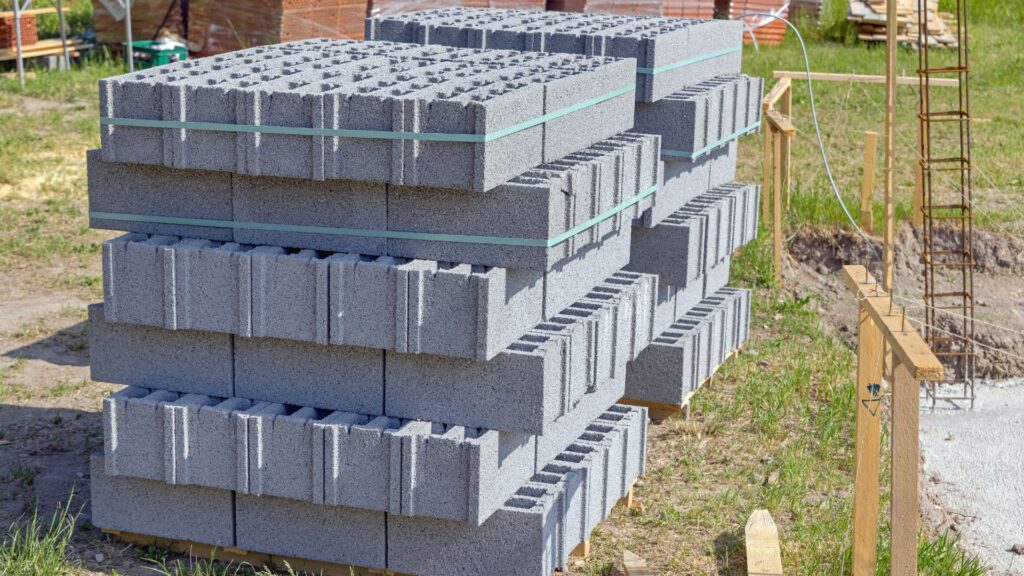
Types Of Concrete Blocks In NZ
Concrete blocks come in a range of types, each designed for different building needs. Understanding the main categories will help you choose the right option for your project, whether it’s a new wall, a landscaping job, or a small DIY build.
- Standard hollow blocks: These are the most common type of concrete block used in New Zealand construction. They have a hollow core, which makes them lighter than solid blocks while still offering strength and stability. They are often used in the foundations of houses, boundary walls, and other structural builds.
- Solid blocks: Solid concrete blocks are denser and heavier than hollow ones, which makes them stronger and more durable. They are usually chosen for load-bearing walls and projects where high strength is a must. Because of their weight, they may require more effort to install, but the payoff is long-term durability.
- Decorative or breeze blocks: These blocks are popular for their design appeal. They often feature patterns or cut-outs that allow light and air to pass through, making them ideal for fences, partitions, and feature walls. Breeze blocks are a great way to add both function and style to outdoor spaces.
- Retaining wall blocks: These interlocking blocks are designed specifically for landscaping and garden projects. They fit together securely without the need for mortar, making them a practical choice for retaining walls, raised garden beds, and terraces. Their strength helps hold back soil while still creating an attractive look.
- Lightweight blocks: As the name suggests, these blocks are easier to handle and are often made with materials that reduce their density. They are best suited for smaller DIY projects where ease of use matters more than heavy-duty strength. Lightweight blocks are popular with homeowners who prefer to manage their own garden or small-scale builds.
Choosing the right type of concrete block depends on the balance between strength, appearance, and ease of use. By knowing the purpose of each type, you can make smarter decisions that save time, money, and effort in your project.
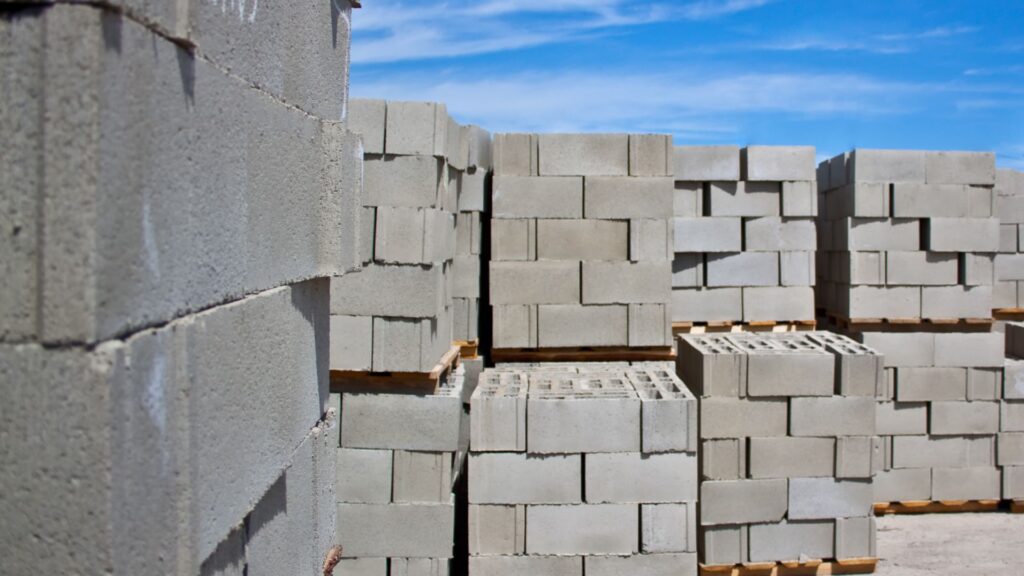
Common Uses For Concrete Blocks
Concrete blocks are one of the most versatile building materials available in New Zealand. They offer strength, durability, and a wide range of applications that suit both residential and commercial projects. Below are the most common uses where concrete blocks prove to be both practical and reliable.
Building Foundations And Walls
Concrete blocks are widely used for structural foundations and walls. They provide a solid base that can support heavy loads, making them ideal for houses, garages, and even commercial buildings. Their fire resistance and ability to withstand harsh weather conditions add to their appeal. Tip: Always consult a builder or engineer when using blocks for structural purposes to ensure compliance with NZ building standards.
Landscaping Projects
From retaining walls to garden edging, concrete blocks are a favorite choice for landscaping. Retaining walls help manage soil movement and create leveled areas on sloped land. Garden edging made from blocks can keep pathways and planting beds neat and defined. Tip: Retaining walls should include proper drainage to prevent water buildup and structural failure.
Outdoor Features
Concrete blocks are perfect for adding practical and decorative outdoor features. They can be used to build BBQ areas, raised planters, and fences that complement your garden. With a coat of paint or a decorative finish, these projects can blend seamlessly into outdoor spaces. Tip: Choose decorative breeze blocks if you want both functionality and visual appeal.
Commercial And Public Spaces
In commercial settings, concrete blocks are used for schools, offices, and public buildings. Their durability ensures they can withstand heavy foot traffic and frequent use. They also provide sound insulation, which is valuable in busy environments. Tip: For large-scale projects, work with suppliers who can provide blocks in bulk and ensure consistent quality.
Concrete blocks are more than just basic building units; they are adaptable solutions that fit into nearly every type of project. Whether you are planning a simple garden feature or constructing a new building, their reliability makes them a trusted option across New Zealand.
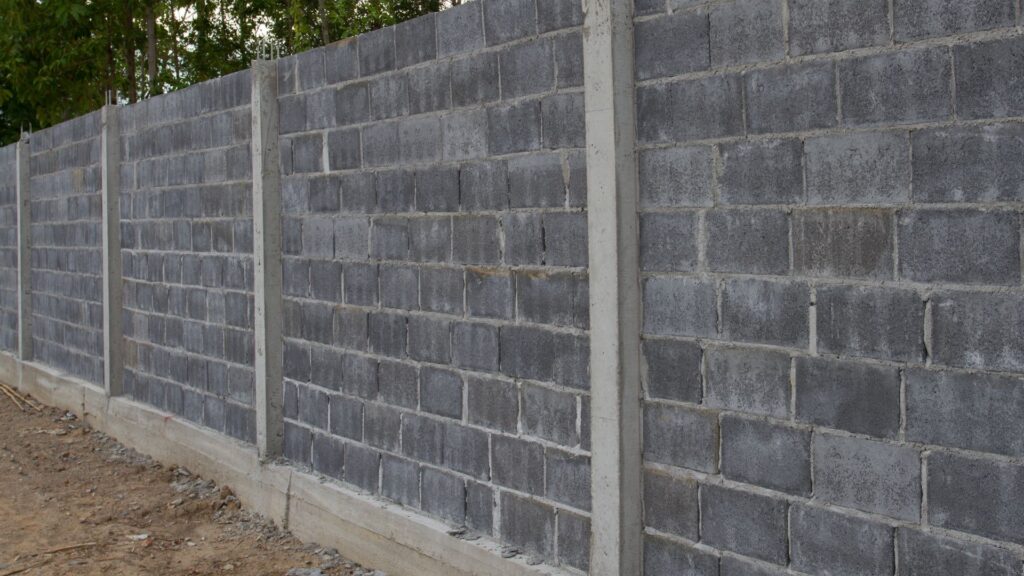
Pros And Cons Of Concrete Blocks
When it comes to building in New Zealand, concrete blocks remain one of the most reliable and cost-effective materials available. They are a popular choice for both residential and commercial projects because they combine strength with versatility. Like any building material, though, concrete blocks have their strengths and weaknesses. Understanding both sides will help you make an informed decision about whether they are right for your project.
Pros
- Affordable and widely available in NZ: Concrete blocks are among the most budget-friendly options for construction. Because they are mass-produced locally, they are easy to source in most regions across New Zealand, which helps keep costs low.
- Long-lasting and fire-resistant: Once installed, concrete blocks can last for decades with very little maintenance. They are also fire resistant, making them a safer choice for homes and buildings compared to timber.
- Good for insulation and noise reduction: Concrete blocks naturally provide thermal mass, which means they help keep homes cooler in summer and warmer in winter. They also reduce noise, making them useful for urban housing or properties near busy roads.
- Can be painted or rendered for a modern look: Although plain in their raw form, concrete blocks can be finished with paint, render, or cladding. This flexibility makes it easy to achieve a modern appearance that suits different architectural styles.
Cons
- Heavy to transport and install: Concrete blocks are dense and can be challenging to handle without the right equipment. Transport and installation often require more labour compared to lighter materials.
- Can look plain without finishing: In their natural state, concrete blocks have a basic, industrial look. Without paint or rendering, they may not provide the level of visual appeal many homeowners want.
- Not ideal for small decorative work compared to bricks: For intricate or highly detailed design features, bricks or other materials may be better suited. Concrete blocks are more practical for larger, structural work.
Like anything in building, they are not perfect, but the advantages often outweigh the downsides. With their durability, affordability, and flexibility, concrete blocks remain a trusted option for many projects in New Zealand.
If you are considering concrete blocks for your next project, weigh both the pros and cons carefully. By matching the strengths of the material to your specific needs, you can decide whether they are the right fit for your build.
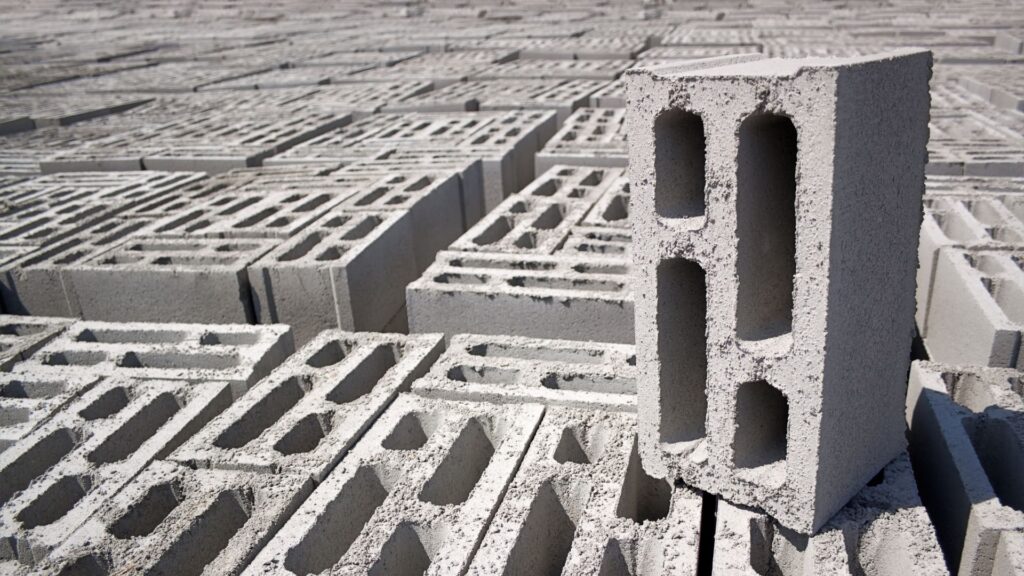
Cost Of Concrete Blocks In NZ
When planning a building or landscaping project, understanding the cost of concrete blocks in NZ is one of the most important steps. Prices vary widely depending on the type of block, the style you choose, and where you purchase them. While it is difficult to provide exact figures because they change between suppliers, you can think of costs in terms of ranges and categories.
- General price ranges: Basic hollow concrete blocks are usually the most affordable and are often used for standard walls or foundations. Decorative blocks, sometimes called breeze blocks, cost more because of their unique designs and the extra work required to produce them. Retaining wall blocks tend to sit at the higher end of the range since they are engineered for strength, interlocking ability, and long-term stability.
- Factors that influence price: Several elements affect how much you will pay. Size plays a big role, as larger blocks cost more per unit. Style and finish also add to the price, with plain blocks being cheaper than textured or patterned options. The quantity you need impacts your total spend, buying in bulk often reduces the cost per block. Finally, suppliers may set different rates depending on availability, delivery distance, and brand reputation.
- Additional costs: Beyond the blocks themselves, you need to budget for extra expenses. Transport can increase your overall cost, especially if you live far from the supplier. Mortar, reinforcement materials, and tools are other essentials to consider. Labour is another major factor, if you are not doing the work yourself, the cost of hiring a professional to lay the blocks will add to your total budget.
- Budgeting tips: To keep your project realistic, always factor in both the cost of the materials and the time it takes to complete the work. For example, if you are building a fence, remember that labour and preparation are just as important as the blocks themselves. Getting quotes from multiple suppliers and contractors will help you stay within your budget while still achieving a durable and attractive result.
A clear understanding of the costs involved will help you make smarter decisions and avoid unexpected expenses, giving you confidence as you move forward with your project.
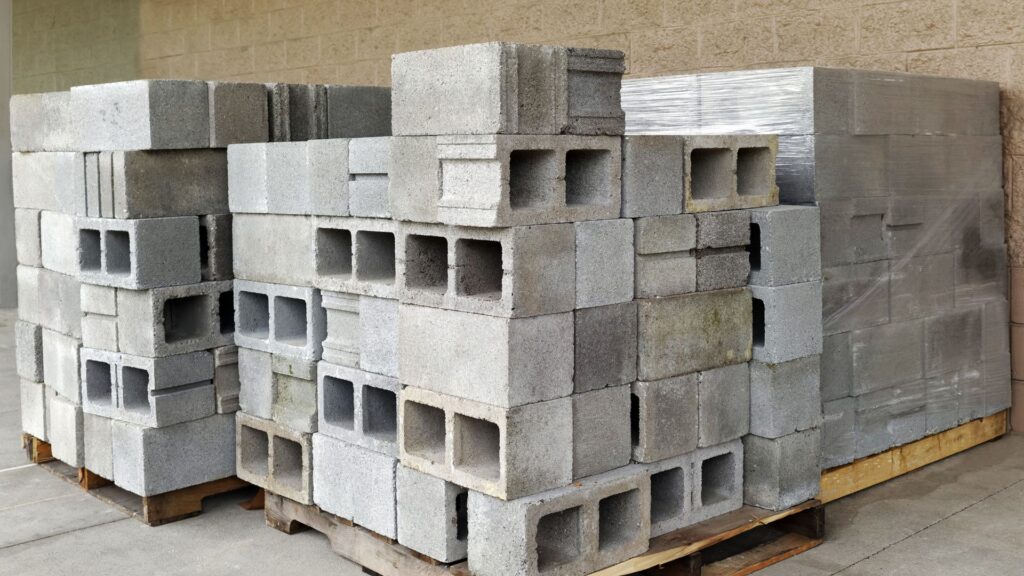
Where To Buy Concrete Blocks In NZ
When it comes to purchasing concrete blocks in New Zealand, you have several reliable options that suit different budgets, project sizes, and preferences. The availability of these blocks across the country makes it easier for both homeowners and builders to find the right product for their needs.
- Major hardware chains: Stores such as Mitre 10 and Bunnings are the go-to destinations for many New Zealanders looking for concrete blocks. These retailers typically stock a wide range of standard and decorative options, making them convenient for DIY projects and smaller builds. One of their biggest advantages is accessibility, with locations spread across the country and clear pricing that helps with budgeting.
- Local masonry suppliers: For larger construction projects or more specialized requirements, local masonry suppliers often provide a broader selection of concrete block sizes and finishes. Many of these suppliers can also offer expert advice tailored to specific project needs, including structural requirements and compliance with New Zealand building codes. This option is especially beneficial if you need bulk orders or custom block types that may not be available in general hardware stores.
- Specialist landscape and retaining wall providers: If your project involves landscaping or retaining walls, working with specialist providers is a smart choice. These businesses often carry interlocking blocks, decorative finishes, and engineered options designed specifically for outdoor use. They can also provide guidance on drainage and reinforcement, which are critical factors in retaining wall projects.
- Tips: Buying in bulk can save money, especially for larger builds, but it is also important to factor in delivery costs and logistics. Some suppliers offer delivery services, which can be a major advantage if you are working on a site with limited access. Always check availability in advance to avoid delays, particularly if you are sourcing specific block styles or finishes that may not be kept in regular stock.
Concrete blocks are widely available across NZ, and choosing the right supplier comes down to the size of your project, your design preferences, and your budget. Whether you prefer the convenience of major chains or the expertise of local specialists, the right source will help ensure your project runs smoothly from start to finish.
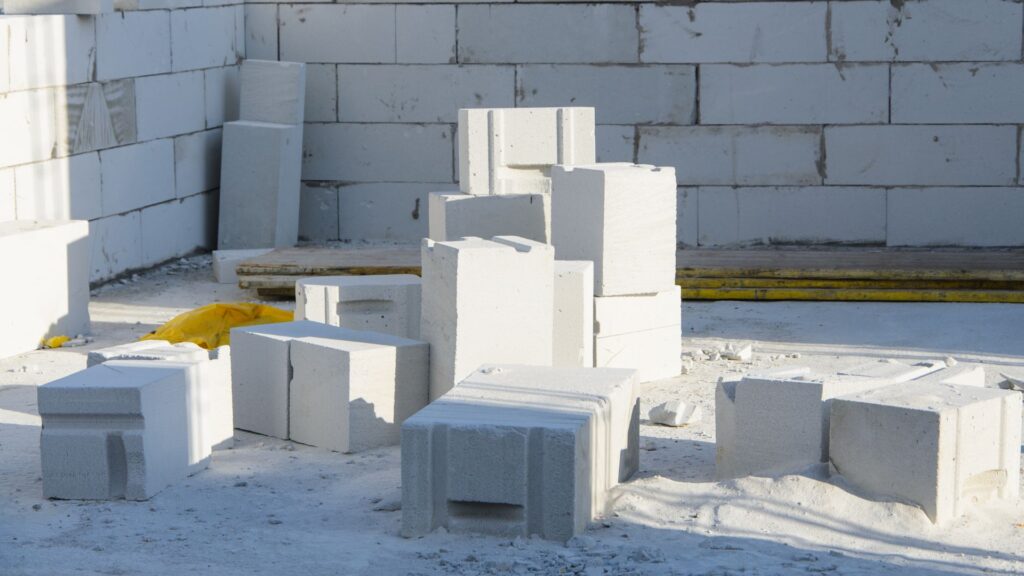
Tips For Choosing The Right Concrete Blocks
Choosing the right concrete blocks in NZ can make a huge difference to the success and lifespan of your project. Not all blocks are the same, and what works for a small garden wall may not be suitable for a structural foundation. Taking the time to evaluate your needs will help you avoid unnecessary costs and future issues.
- Match type of block to project: For DIY jobs like edging or small garden walls, lightweight or decorative concrete blocks are a practical choice. They are easier to handle and install, even if you are not a professional builder. On the other hand, if you are constructing a structural wall, a retaining wall, or a house foundation, you will need stronger blocks, such as hollow or solid concrete blocks, that can handle reinforcement and heavy loads.
- Consider appearance: Concrete blocks are not only functional but also influence the look of your outdoor or indoor space. Decorative or breeze blocks add character and can be used for fences, screens, or garden features. Standard plain blocks may suit projects where the surface will be plastered or painted, but if you want your wall to have visual appeal on its own, decorative options are worth the investment.
- Think about future maintenance: While concrete blocks are generally low maintenance, some options may require additional finishing or sealing to protect them over time. Painted or rendered blocks, for example, will need upkeep to maintain their appearance. Choosing the right type from the start helps reduce ongoing maintenance costs.
- Ask suppliers about drainage, reinforcement, and NZ building code compliance: Not all concrete blocks are created for the same purpose. Always confirm with suppliers whether the blocks meet New Zealand building standards for your specific project. If you are building a retaining wall, proper drainage is essential to prevent water buildup and potential structural damage. Reinforcement may also be required for taller or load-bearing walls. Getting professional advice ensures that your project is both safe and compliant.
Don’t just grab the cheapest block on the shelf, consider how it will look, how long it will last, and whether it is right for your project. A little planning up front will save you money, time, and effort in the long run.
The right concrete blocks can make or break a project, so always take the time to compare options, ask questions, and choose blocks that balance durability, appearance, and compliance. By doing so, you’ll create a build that not only lasts but also adds value to your space.
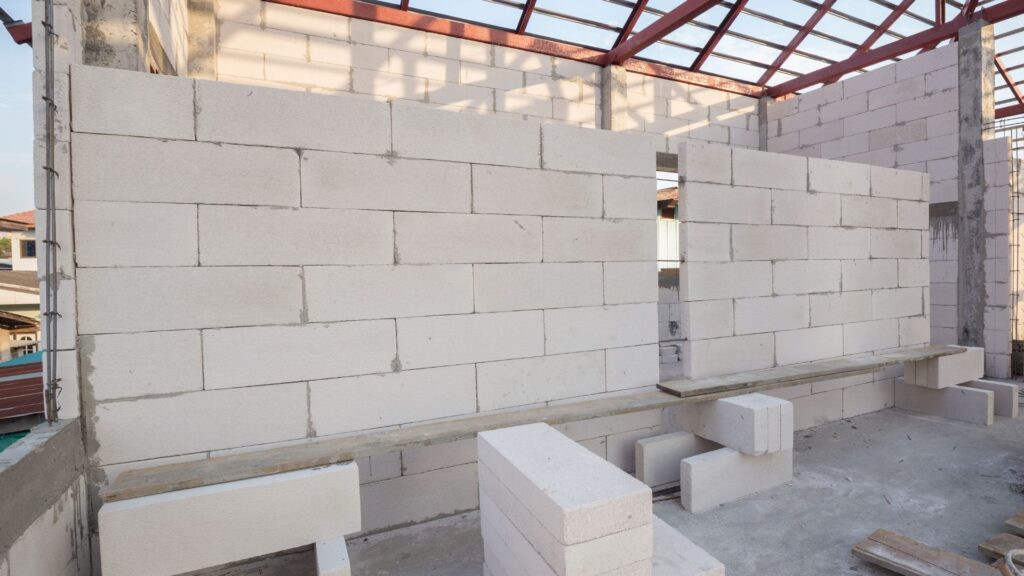
DIY Vs Hiring A Professional
Taking on a concrete block project in New Zealand can be exciting, but deciding whether to do it yourself or hire a professional depends on the size and complexity of the job. Many homeowners enjoy the challenge of DIY, while others prefer the peace of mind that comes with professional expertise.
- What’s easy to DIY: Smaller projects like garden edging, low garden walls, or simple planters can usually be handled without professional help. These tasks don’t require structural reinforcement, and most people with basic tools and patience can complete them over a weekend. DIY projects are also a good way to save money if you only need a few blocks for landscaping or decorative features.
- When to call a professional: Larger projects such as structural walls, retaining walls, or anything involving drainage should be left to experienced builders. These projects often require permits, engineering knowledge, and proper reinforcement. A professional can ensure the wall is built to code, strong enough to hold back soil, and safe in the long term.
- Risks of DIY mistakes: Without the right skills, common issues include cracks in the blocks, walls that lean or collapse, and poor drainage that leads to water damage. These problems can cost more to fix later than hiring a professional from the start. Safety is also a concern, especially if the wall is tall or carries weight.
- Encouraging safe and realistic decision-making: The key is knowing your limits. If you enjoy hands-on projects, start small and learn as you go. For bigger, more complex builds, bringing in a professional ensures quality, compliance, and durability. This way, you avoid costly mistakes and keep your project safe.
Choosing between DIY and hiring a professional for concrete block projects in NZ comes down to balancing skill, budget, and safety. By being realistic about what you can manage and when to seek help, you’ll get the best results for your project and peace of mind that it will stand the test of time.
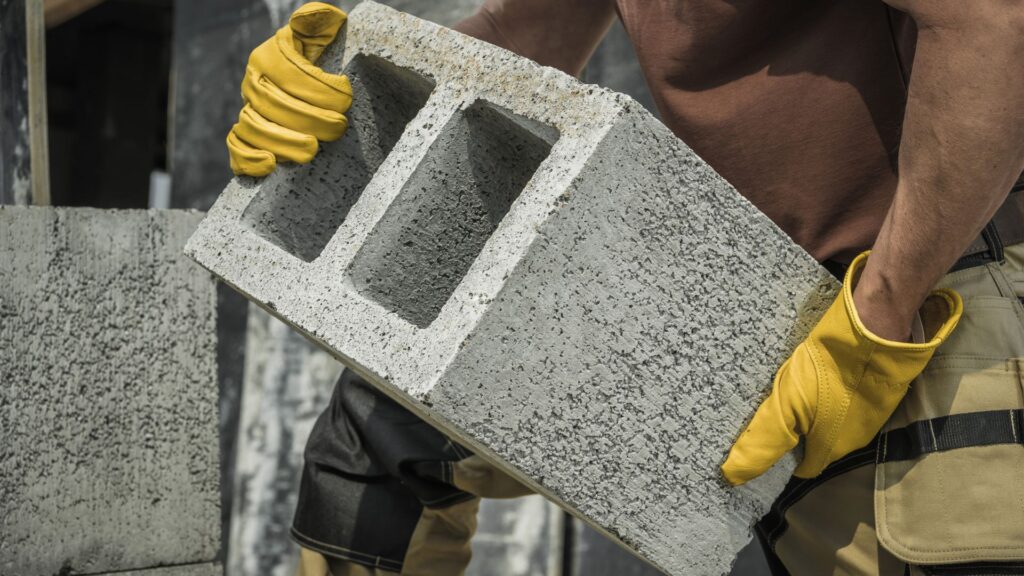
Sustainability And Eco-Friendly Options
Concrete blocks are not just valued for their durability and strength. In New Zealand, they are also part of a growing shift toward sustainable and environmentally friendly building practices. When chosen wisely, concrete blocks can support projects that reduce environmental impact and promote long-term resilience.
- Recycled concrete blocks: Many suppliers now offer concrete blocks made from recycled aggregates or crushed concrete. These blocks reduce the demand for raw materials while giving construction waste a second life. Using recycled content is one of the simplest ways to lower the carbon footprint of your project.
- Locally sourced materials reduce transport emissions: Concrete blocks made in New Zealand help cut down emissions from overseas shipping. By sourcing from local quarries and manufacturers, you support the local economy while reducing the environmental costs of transport. This makes locally sourced blocks a smart choice for eco-conscious builders.
- Long lifespan = less waste: One of the biggest advantages of concrete blocks is their longevity. Unlike timber, which may rot or require frequent replacement, concrete blocks last for decades with minimal maintenance. This durability means fewer replacements, less material waste, and better value over the life of a building or landscape feature.
- Tie to NZ’s focus on sustainable building practices: New Zealand’s building industry is putting more emphasis on sustainability. From government policies to community-led projects, there is a clear demand for greener construction solutions. Concrete blocks fit into this focus by offering recyclable, locally sourced, and long-lasting options that align with national goals for a more sustainable future.
Concrete blocks are more than a practical building material, they can be an environmentally responsible choice too. By selecting recycled, locally produced, and long-lasting options, you help reduce waste, cut emissions, and support sustainable building across New Zealand.
Ready to start your next project? Explore our full range of concrete blocks and building solutions. Visit us today.
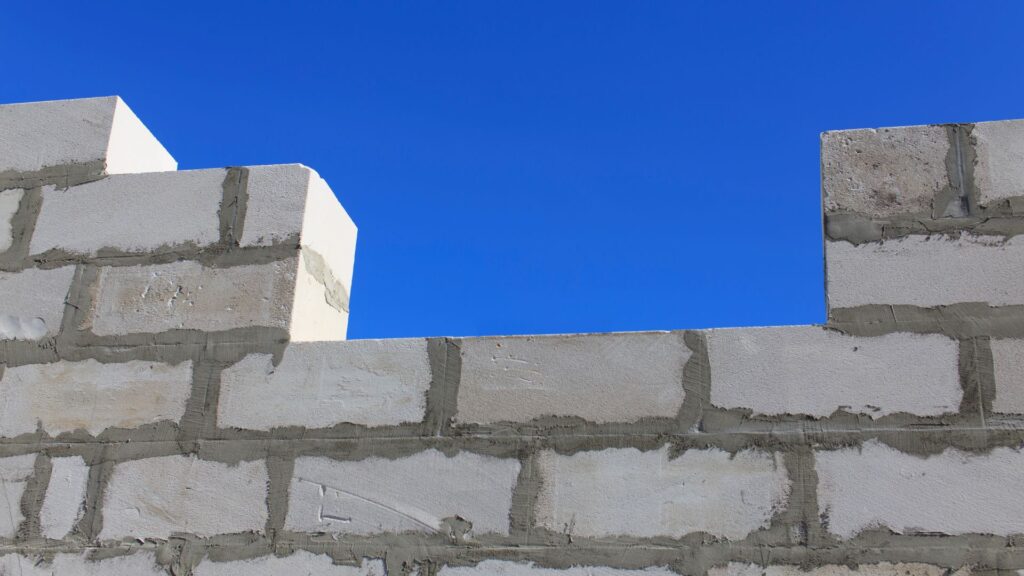
FAQs: About Concrete Blocks In NZ
Concrete blocks are commonly used for building walls, house foundations, retaining walls, fences, and landscaping projects across New Zealand.
Yes, concrete blocks are durable, weather-resistant, and well-suited to New Zealand’s varying climate conditions.
You can find standard hollow blocks, solid blocks, decorative breeze blocks, retaining wall blocks, and lightweight options for DIY projects.
Prices vary depending on size, type, and supplier. Basic blocks are affordable, while decorative and retaining wall blocks are more expensive.
Concrete blocks are available at major hardware chains like Mitre 10 and Bunnings, as well as from local masonry suppliers and landscaping specialists.
DIY is possible for small projects like garden walls or edging, but for structural walls and retaining walls, it’s best to hire a professional.
They are affordable, long-lasting, fire-resistant, and versatile. They also provide good insulation and can be painted or finished for a modern look.
Yes. They are heavy to handle, can look plain without finishing, and may require professional installation for larger projects.
Concrete blocks can be eco-friendly when made with recycled materials. Their long lifespan and local sourcing also reduce environmental impact.
Consider the purpose of your project, appearance, durability, and compliance with NZ building codes. Ask your supplier for guidance if unsure.
Conclusion
Concrete blocks are a reliable choice for NZ projects because they combine strength, affordability, and versatility in one building material. From retaining walls and garden features to full-scale home construction, they stand up well to New Zealand’s climate and deliver long-lasting results with minimal maintenance. Whether you’re tackling a small DIY job or planning a larger build, concrete blocks offer a practical and lasting solution that suits a wide range of needs. Check your local suppliers, compare options carefully, and start building with confidence knowing you’re investing in a material trusted across countless projects throughout New Zealand.
About the Author:
Mike Veail is a recognized digital marketing expert with over 6 years of experience in helping tradespeople and small businesses thrive online. A former quantity surveyor, Mike combines deep industry knowledge with hands-on expertise in SEO and Google Ads. His marketing strategies are tailored to the specific needs of the trades sector, helping businesses increase visibility and generate more leads through proven, ethical methods.
Mike has successfully partnered with numerous companies, establishing a track record of delivering measurable results. His work has been featured across various platforms that showcase his expertise in lead generation and online marketing for the trades sector.
Learn more about Mike's experience and services at https://theleadguy.online or follow him on social media:
